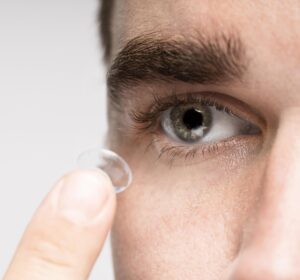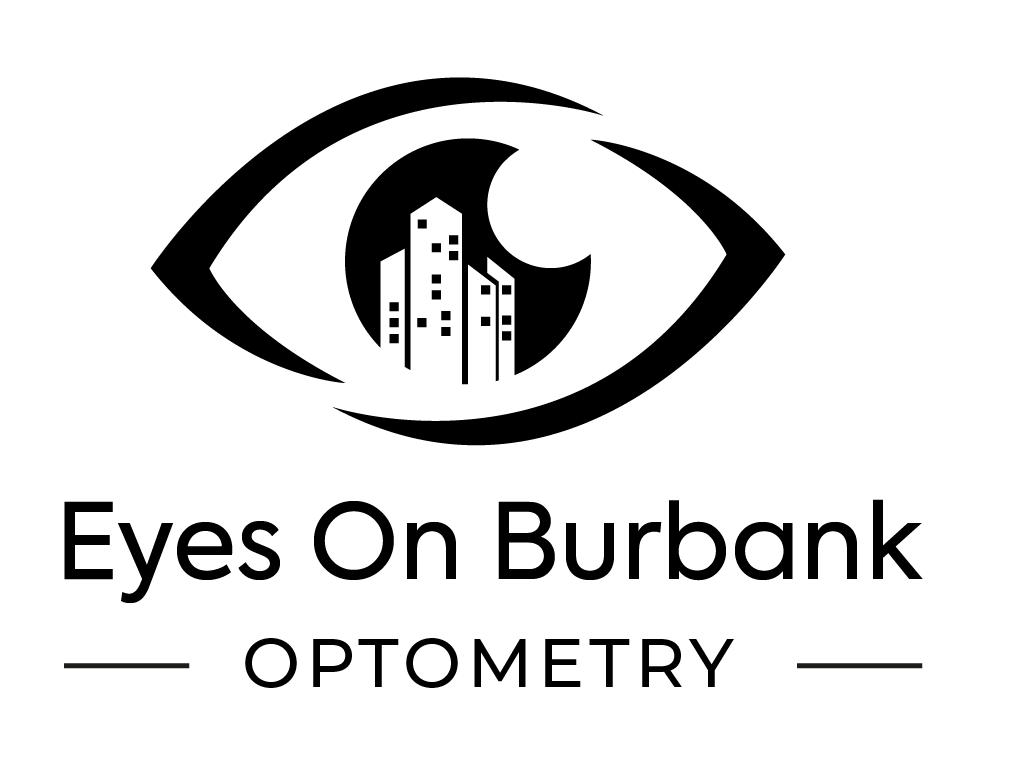Exploring Your Contact Lens Options
When it comes to selecting contact lenses, patients have a variety of options designed to fit their unique vision needs. After a contact lens exam at Eyes on Burbank Optometry, our optometrists will recommend a contact lens that best suits your specific visual needs.
Here’s an overview of the different types of contact lenses available.

Custom Eye Exams for Contacts
Before selecting any type of contact lens, it’s essential to undergo a comprehensive eye examination tailored specifically for contact lens wearers. Unlike a standard vision exam, a contact lens evaluation involves additional measurements to assess your corneal curvature, pupil size, and tear film quality. These details help your eye care provider determine which lens materials, sizes, and designs will offer the best fit and performance for your unique eyes. If you have dry eyes, astigmatism, or other ocular health concerns, your doctor will take these into account when recommending the most suitable options.
Daily Disposable Lenses
Daily disposables, commonly known as “dailies,” are among the most convenient types of contact lenses available. Designed to be worn in the morning and discarded at the end of the day, they eliminate the need for cleaning, storage, and disinfection. These lenses are a popular choice for individuals with active lifestyles, teenagers, or those who wear contacts only occasionally (such as for sports or social events). Additionally, they tend to reduce the risk of eye infections and allergic reactions, since you’re starting each day with a fresh, sterile lens.
Multifocal Contacts
Multifocal contact lenses help you see clearly at all distances—near, far, and in between—without needing reading glasses. They’re ideal for people with presbyopia, a common age-related condition that makes near vision harder after the age of 40.These lenses have multiple prescriptions built into one lens, allowing the eyes to be able to see far and near at the same time and eliminating the need for readers. They come in soft or rigid materials and are available as daily, bi-weekly, monthly, or custom lenses. They are a great option for patients who prefer a more seamless visual experience, lead an active lifestyle and want freedom from multiple pairs of glasses.
Specialty Lenses for Challenging Fits
Some patients are considered “hard-to-fit” due to conditions such as high astigmatism, dry eye syndrome, post-surgical corneas, or irregular corneal shapes. In such cases, standard contact lenses may not provide sufficient comfort or vision correction.
Specialty lenses—such as toric lenses for astigmatism, hybrid lenses (which combine a rigid center with a soft skirt), and custom-made lenses—are crafted to address these specific challenges. These advanced lens designs ensure a more precise fit, improved stability, and greater comfort for those who have struggled with standard contacts in the past.

Myopia Control Contact Lenses
Myopia control contact lenses are specially designed to slow the progression of nearsightedness (myopia) in children and young adults. Unlike regular lenses that only correct vision, these lenses actively help manage how the eye grows—aiming to reduce the final prescription by the time a child completes their visual development.
There are several types of myopia control lenses available, including:
Soft multifocal lenses use specially designed optical zones to provide clear vision while also signaling the eye to slow its elongation, helping to reduce the progression of myopia
Orthokeratology (Ortho-K) lenses. worn overnight to gently reshape the cornea and provide clear vision during the day
By starting early, these lenses can significantly reduce how strong a child’s prescription becomes as they grow, potentially lowering their final prescription in adulthood. This not only improves day-to-day vision but also helps reduce the long-term risks associated with high myopia, such as retinal detachment, glaucoma, and macular degeneration.
Lenses for Keratoconus. Keratoconus is a progressive condition in which the cornea thins and bulges outward into a cone shape, leading to distorted and blurred vision. For patients with keratoconus, conventional soft lenses are often ineffective.
Instead, optometrists may recommend rigid gas permeable (RGP) lenses or scleral lenses:
RGP lenses maintain their shape on the eye, helping to mask the irregular corneal surface and provide clearer vision.
Scleral lenses are larger and rest on the white part of the eye (the sclera), vaulting over the cornea entirely. They are particularly beneficial for those with advanced keratoconus or who have undergone corneal transplants.
These lenses require specialized fitting but can dramatically improve visual quality and comfort for affected patients.
When it comes to contact lenses, one size does not fit all. From daily disposables to custom specialty lenses, there is a solution for nearly every visual challenge. Your eye health, prescription needs, and lifestyle preferences all play a role in determining the best lens for you.
Consulting with a qualified optometrist is key to exploring your options and ensuring your lenses provide not just clear vision, but also long-term eye health and comfort. If you’re considering contact lenses or looking to upgrade your current pair, schedule a personalized consultation today. Call us today at 818-476-4606 or Book Online to schedule a contact lens exam.


